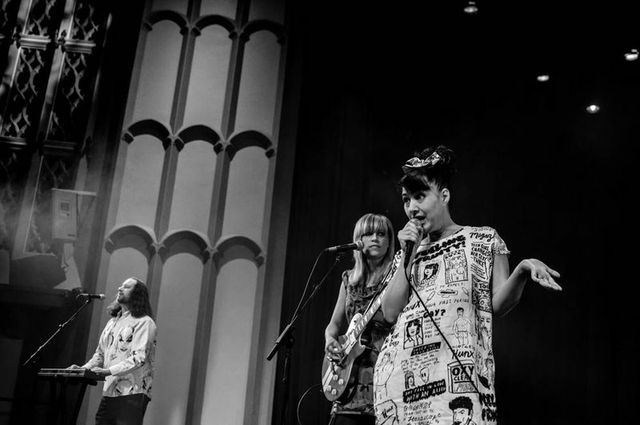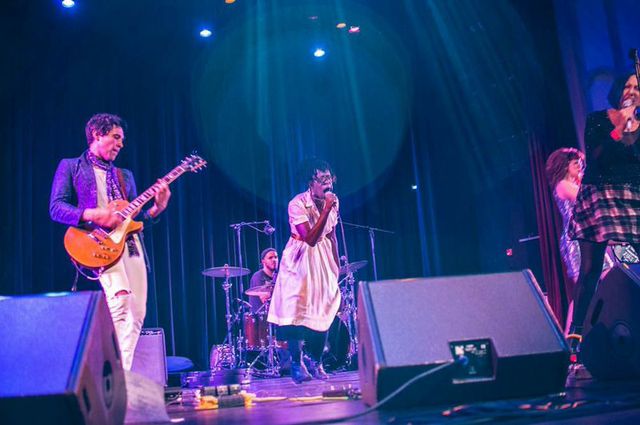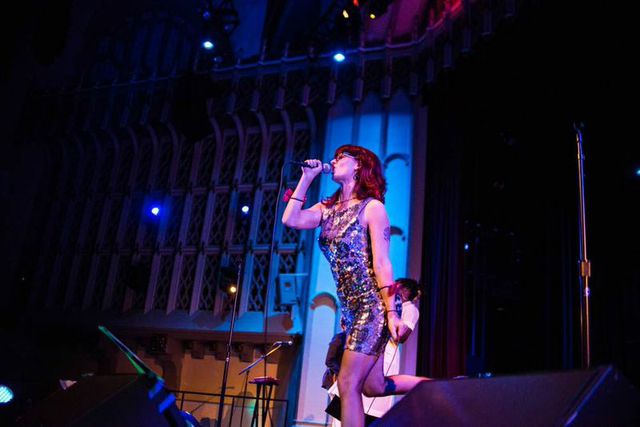Julie Ruin and The Sex Stains concert photographs by Caren Spitler
|
It was a true riot grrrl revival, proving that some 90’s feminist heroes refuse to “go quietly into that good night.” Monday, November 3rd, hundreds of USC students and others were treated to a free punk show as part of the University’s “Visions and Voices” series at the Bovard Auditorium. Counterculture legend Kathleen Hanna’s newest incarnation, The Julie Ruin, headlined the night, with opening act Sex Stains, featuring her riot grrrl co-founder Alison Wolfe (formerly of Bratmobille). The concert was a follow-up to the screening and discussion of the 2013 documentary “The Punk Singer,” profiling feminist punk icon Kathleen Hanna of Bikini Kill and Le Tigre. Both events were organized by USC faculty members and fine artists A.L. Steiner and Jennifer West. Chronicling the early days of Hanna in Bikini Kill, the film provides insight into the consequences of speaking your mind in a world that just wants you to act nice and be pretty, while also shedding some light on Le Tigre’s breakup, and Hanna’s tumultuous struggle with late-stage Lyme disease. Emerging from the primordial musical soup of the fertile Pacific Northwest, the riot grrrl subculture of feminist-punk sprung up around the same time as the birth of grunge. Speaking to more than just feminists at the time, sonic muses Hanna and her contemporaries championed ideals running counter to a heteronormative culture before we began to examine what that actually meant to us; lyrically breaking ground for a plethora of complex issues concerning all to which women – and all of humanity – should aspire. The night began with a long line of fans awaiting the show outside the historic hall. Surveying the crowd, the diverse appeal of both Hanna and Wolfe was quite evident. Fans of all ages, social strata and cultural identities stood together, sharing the music and cult followings of the artists as common ground. This was the best of what the Los Angeles punk scene of the 80’s and 90’s once offered. Here, renewed, were the followers of a loud-mouth, outspoken madonna. As everyone filed into the stunning building and took their seats, something felt a bit off – a punk band with the entire audience in their seats? Even though this wasn’t the 1990’s crowd of twenty-something female youth refusing to stand-down to a typically testosterone-fueled genre, it was still oddly calm. However, once the Sex Stains took the stage, it wasn’t long into their first song before most of the room was on it’s feet, and balance was restored.. Sex Stains are Allison Wolfe & Mecca Vazie Andrews (vocals), Sharif Dumani (guitar), Pachy Garcia (bass) and David Orlando (drums). With a name conjuring up mental images of salacious acts in scummy hotel rooms, Wolfe and her bandmates continue to flip the script on feminism, sporting a moniker that is clearly a slap in the face to those who expect feminists to be sexually neutered. Their music makes that clear with titles like “Sex in the Subway?” and “Don’t Hate Me Cuz I’m Beautiful.” Singers Andrews and Wolfe have very different performance styles. Wolfe’s she-bop, coquettish, and care-free vibe is juxtaposed with Andrew’s more erratic and volatile delivery; and both are completely engaging on stage. Sex Stains played through their set with little talking, but just before the final song, Wolfe announced that they only had one more song for the night, proclaiming “that will be that for the Sex Stains, but you can’t wash it off!” The band was then joined onstage by Violence Girl herself, Alice Bag, for a rambunctious revival of The Bags’ song “We Will Bury You”. Next, The Julie Ruin (Kathleen Hanna, Kathi Wilcox (Bikini Kill), Kenny Mellman, Carmine Covelli, and Sara Landeau) took the stage – Hanna decked out in a two-tone illustrated dress with her hair wound up into a high bun adorned with a shiny gold bow. She thanked everyone for standing up, saying something to the effect that it worried her when people stayed seated. She stretched out the intro to the opening song “V.G.I.” (the acronym for Valley Girl Intelligentsia), before initiating her full attack. In a recent interview Hanna said that after seeing herself perform in Bikini Kill for the first time “ I didn’t even recognize myself. I mean, I was a total freakazoid ball of energy!” She may not realize it, but her performance style is still there in all the best ways. The band’s visual, audio, and lyrical content is a rompin’ pop-punk bacchanalia, with punk-chanteuse Hanna’s signature delivery plastered all over it. Though Hanna sings most of the songs, keyboardist Kenny Mellman did take over vocal duties for one tune. Their songs are filled with soul-pleasing major keys that, at face value, seem all bright and shiny, but which occasionally wander into the dark, forbidden territory of cultural desperation. Firebrand Hannah delivered some socially-charged songs, such as “Radical or Pro-Parental,” which bared that pain to the world. Vocally Hanna is still strong, clear, and concise and on stage she exhibits the same boundless energy – but with less of the nervous, kinetic anger she displayed in the 90’s. She spoke a bit about her illness, but there was no evidence of its effects as she moved across the stage. Throughout their set, Hannah seemed somewhat surprised by the things that were coming out of her own mouth. At a couple of points she was even apologetic, worried that she was being a downer. (Not even a bit actually, but it was quite insightful and, at points,.surprisingly frank.) The singer showed an introspective side the room may not have been expecting. Her micro-monologues were served up with an articulate humor, and edgy wit which helped her seem accessible, familiar, and made you want to hear even more. Still “the girl you can’t shut up,” the singer/activist clearly has things left to say and do, even if her point of view has changed.
|





